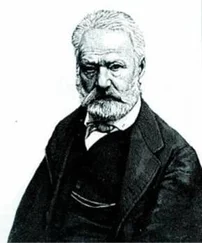Victor Hugo - Les Misérables, v. 3
Здесь есть возможность читать онлайн «Victor Hugo - Les Misérables, v. 3» — ознакомительный отрывок электронной книги совершенно бесплатно, а после прочтения отрывка купить полную версию. В некоторых случаях можно слушать аудио, скачать через торрент в формате fb2 и присутствует краткое содержание. Жанр: literature_19, foreign_antique, foreign_prose, на английском языке. Описание произведения, (предисловие) а так же отзывы посетителей доступны на портале библиотеки ЛибКат.
- Название:Les Misérables, v. 3
- Автор:
- Жанр:
- Год:неизвестен
- ISBN:нет данных
- Рейтинг книги:4 / 5. Голосов: 1
-
Избранное:Добавить в избранное
- Отзывы:
-
Ваша оценка:
- 80
- 1
- 2
- 3
- 4
- 5
Les Misérables, v. 3: краткое содержание, описание и аннотация
Предлагаем к чтению аннотацию, описание, краткое содержание или предисловие (зависит от того, что написал сам автор книги «Les Misérables, v. 3»). Если вы не нашли необходимую информацию о книге — напишите в комментариях, мы постараемся отыскать её.
Les Misérables, v. 3 — читать онлайн ознакомительный отрывок
Ниже представлен текст книги, разбитый по страницам. Система сохранения места последней прочитанной страницы, позволяет с удобством читать онлайн бесплатно книгу «Les Misérables, v. 3», без необходимости каждый раз заново искать на чём Вы остановились. Поставьте закладку, и сможете в любой момент перейти на страницу, на которой закончили чтение.
Интервал:
Закладка:
He had, however, given up everything, and did not join the opposition or conspire. He shared his thoughts between the innocent things he did and the great things he had done, and he spent his time in hoping for a carnation or calling to mind Austerlitz. M. Gillenormand kept up no relations with his son-in-law; the Colonel was to him a "bandit," and he was for the Colonel an "ass." M. Gillenormand never spoke about the Colonel, except at times to make mocking allusions to "his barony." It was expressly stipulated that Pontmercy should never attempt to see his son or speak to him, under penalty of having him thrown on his hands disinherited. To the Gillenormands, Pontmercy was a plague patient, and they intended to bring up the child after their fashion. The Colonel perhaps did wrong in accepting these terms, but he endured them, in the belief that he was acting rightly, and only sacrificing himself.
The inheritance of the grandfather was a small matter, but that of Mlle. Gillenormand the elder was considerable, for this aunt was very rich on her mother's side, and her sister's son was her natural heir. The boy, who was called Marius, knew that he had a father, but nothing more, and no one opened his lips to him on the subject. Still, in the society to which his grandfather took him, the whisperings and winks eventually produced light in the boy's mind; he understood something at last, and, as he naturally accepted, by a species of infiltration and slow penetration, the ideas and opinions which were, so to speak, his breathing medium, he gradually came to think of his father only with shame.
While he was thus growing up in this way, the Colonel every two or three months came furtively to Paris, like a convict who is breaking his ban, and posted himself at St. Sulpice, at the hour when Aunt Gillenormand took Marius to Mass. Trembling lest the aunt should turn round, concealed behind a pillar, motionless, and scarce daring to breathe, he looked at this boy; the scarred warrior was frightened at this old maid.
Prom this very circumstance emanated his friendship with the Abbé Mabœuf, Curé of Vernon. This worthy priest had a brother, churchwarden of St. Sulpice, who had several times noticed this man contemplating his child, and the scar on his cheek, and the heavy tear in his eye. This man, who looked so thoroughly a man, and who wept like a child, struck the churchwarden, and this face adhered to his memory. One day when he went to Vernon to see his brother he met on the bridge Colonel Pontmercy, and recognized his man of St. Sulpice. The churchwarden told the affair to the Curé, and both made some excuse to pay a visit to the Colonel. This visit led to others; and the Colonel, though at first very close, eventually opened his heart, and the Curé and the churchwarden learned the whole story, and how Pontmercy sacrificed his own happiness to the future of his child. The result was that the Curé felt a veneration and tenderness for him, and the Colonel, on his side, took the Curé into his affection. By the way, when both are equally sincere and good, no men amalgamate more easily than an old priest and an old soldier, for they are the same men at the bottom. One devotes himself to his country down here, the other to his country up there; that is the sole difference.
Twice a year, on January 1st, and Saint George's day, Marius wrote his father letters dictated by his aunt, and which looked as if copied from a handbook, for that was all M. Gillenormand tolerated; and the father sent very affectionate replies, which the grandfather thrust into his pocket without reading.
CHAPTER III
REQUIESCANT!
The salon of Madame de T – was all that Marius Pontmercy knew of the world, and it was the sole opening by which he could look out into life. This opening was gloomy, and more cold than heat, more night than day, reached him through this trap. This boy, who was all joy and light on entering the strange world, became thus, in a short time, sad, and what is more contrary still to his age, serious. Surrounded by all these imposing and singular persons, he looked about him with serious astonishment, and all contributed to augment his stupor. There were in Madame de T – 's drawing-room old, noble, and very venerable ladies, who called themselves Mathau, Noé, Levis (pronounced Levi), and Cambis, (pronounced Cambyse). These ancient faces and these Biblical names were mingled in the boy's mind with his Old Testament, which he learned by heart, and when they were all present, seated in a circle round an expiring fire, scarce illumined by a green-shaded lamp, with their severe faces, their gray or white hair, their long dresses of another age, in which only mournful colors could be seen, and uttering at lengthened intervals words at once majestic and stern, little Marius regarded them with wandering eyes and fancied that he saw not women, but patriarchs, and Magi, – not real beings, but ghosts.
With these ghosts were mingled several priests, habitués of this old salon, and a few gentlemen: the Marquis de Sass – , secretary to Madame de Berry; the Vicomte de Val – , who published odes under the pseudonym of Charles Antoine; the Prince de Beauff – , who, though still young, had a gray head and a pretty, clever wife, whose dress of scarlet velvet, with gold embroidery, cut very low in the neck, startled this gloom; the Marquis de C – , d'E – , the Frenchman, who was most acquainted with "graduated politeness;" the Comte d'Am – , a gentleman with a benevolent chin; and the Chevalier de Port de Guy, the pillar of the library of the Louvre, called the King's Cabinet. M. de Port de Guy, bald and rather aging than old, used to tell how in 1793, when he was sixteen years of age, he was placed in the hulks as refractory, and chained to an octogenarian, the Bishop of Mirepoix, also a refractory, but as priest, while he was so as soldier. It was at Toulon, and their duty was to go at night to collect on the scaffold the heads and bodies of persons guillotined during the day. They carried these dripping trunks on their backs, and their red jackets had behind the nape of the neck a crust of blood, which was dry in the morning and moist at night. These tragical narratives abounded in the salon of Madame de T – , and through cursing Marat they came to applaud Trestaillon. A few deputies of the "introuvable" sort played their rubber of whist there; for instance, M. Thibord du Chalard, M. Lemarchant de Gomicourt, and the celebrated jester of the right division, M. Cornet Dincourt. The Bailiff of Ferrette, with his knee-breeches and thin legs, at times passed through this room, when proceeding to M. de Talleyrand's; he had been a companion of the Comte d'Artois, and acting in the opposite way to Aristotle reclining on Campaspe, he had made the Guimard crawl on all fours, and thus displayed to ages a philosopher avenged by a bailiff.
As for the priests, there was the Abbé Halma, the same to whom M. Larose, his fellow-contributor on la Foudre , said, "Stuff, who is not fifty years of age? a few hobble-de-hoys, perhaps." Then came the Abbé Letourneur, preacher to the King; the Abbé Frayssinous, who at that time was neither Bishop, Count, Minister, nor Peer, and who wore a soutane, from which buttons were absent; and the Abbé Keravenant, Curé of St. Germain des Prés. To them must be added the Papal Nuncio, at that date Monsignore Macchi, Archbishop of Nisibi, afterwards Cardinal, and remarkable for his long pensive nose; and another Monsignore, whose titles ran as follow: Abbate Palmieri, domestic Prelate, one of the seven Prothonotaries sharing in the Holy See, Canon of the glorious Liberian Basilica, and advocate of the Saints, postulatore Dei Santi , an office relating to matters of canonization, and meaning very nearly, Referendary to the department of Paradise. Finally, two Cardinals, M. de la Luzerne, and M. de Cl – T – . The Cardinal de Luzerne was an author, and was destined to have the honor a few years later of signing articles in the Conservateur side by side with Chateaubriand; M. de Cl – T – , was Archbishop of Toulouse, and frequently spent the summer in Paris with his nephew the Marquis de T – , who had been Minister of the Navy and of War. The Cardinal de Cl – T – was a merry little old gentleman, who displayed his red stockings under his tucked-up cassock. His specialty was hating the Encyclopædia and playing madly at billiards; and persons who on summer evenings passed along the Rue M – , where M. de Cl – T – then resided, stopped to listen to the sound of the balls and the sharp voice of the Cardinal crying to his Conclavist Monseigneur Cottret, Bishop in partibus of Caryste, "Mark me a carom, Abbé." The Cardinal de Cl – T – had been introduced to Madame de T – by his most intimate friend, M. de Roquelaure, ex-Bishop of Senlis and one of the Forty. M. de Roquelaure was remarkable for his great height and his assiduity at the Academy. Through the glass door of the room adjoining the library, in which the French Academy at that time met, curious persons could contemplate every Thursday the ex-Bishop of Senlis, usually standing with hair freshly powdered, in violet stockings, and turning his back to the door, apparently to display his little collar the better. All these ecclesiastics, although mostly courtiers as much as churchmen, added to the gravity of the salon, to which five Peers of France, the Marquis de Vib – , the Marquis de Tal – , the Marquis d'Herb – , the Vicomte Damb – , and the Duc de Val – , imparted the lordly tone. This Duc de Val – , though Prince de Mon – , that is to say, a foreign sovereign prince, had so lofty an idea of France and the Peerage, that he looked at everything through them. It was he who said, "The Cardinals are the French Peers of Rome, and the Lords are the French Peers of England." Still, as in the present age the Revolution must be everywhere, this feudal salon was ruled, as we have seen, by M. Gillenormand, a bourgeois.
Читать дальшеИнтервал:
Закладка:
Похожие книги на «Les Misérables, v. 3»
Представляем Вашему вниманию похожие книги на «Les Misérables, v. 3» списком для выбора. Мы отобрали схожую по названию и смыслу литературу в надежде предоставить читателям больше вариантов отыскать новые, интересные, ещё непрочитанные произведения.
Обсуждение, отзывы о книге «Les Misérables, v. 3» и просто собственные мнения читателей. Оставьте ваши комментарии, напишите, что Вы думаете о произведении, его смысле или главных героях. Укажите что конкретно понравилось, а что нет, и почему Вы так считаете.












